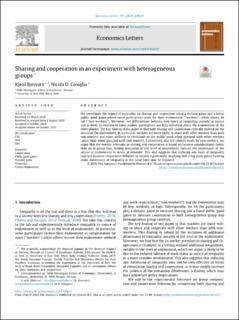Sharing and cooperation in an experiment with heterogeneous groups
Peer reviewed, Journal article
Published version
Permanent lenke
https://hdl.handle.net/11250/2720697Utgivelsesdato
2020Metadata
Vis full innførselSamlinger
- Articles (SAM) [119]
- Publikasjoner fra CRIStin (NHH) [249]
Sammendrag
We investigate the impact of inequality on sharing and cooperation using a dictator game and a linear public good game where some participants work for their endowment (“workers”) while others do not (“non-workers”). Moreover, we differentiate between two types of inequality, namely in source and in level. In contrast to most studies, participants are fully informed about the endowment of the other players. The key finding of our paper is that both sharing and cooperation critically depend on the source of the endowment. In particular, workers are more likely to share with other workers than with non-workers and more inclined to contribute to the public good when grouped with other workers rather than when grouped with non-workers. Considering also the choices made by non-workers, we argue that the worker premium in sharing and cooperation is based on fairness considerations rather than an in-group bias. Adding inequality in the level of endowment reduces the importance of the source of endowment as driver of behavior. This also suggests that reducing one layer of inequality may not improve cooperative behavior in society significantly, implying that a big-push policy tackling many dimensions of inequality at the same time may be required.

